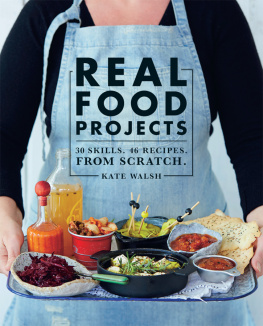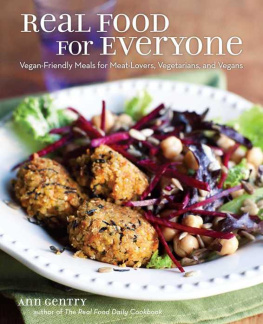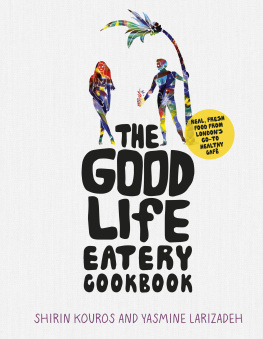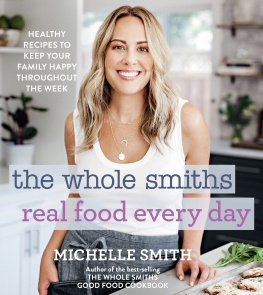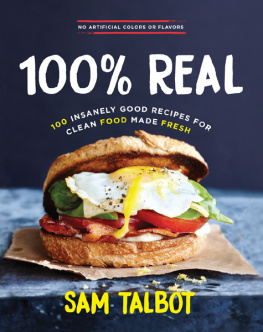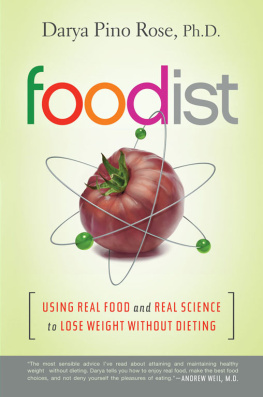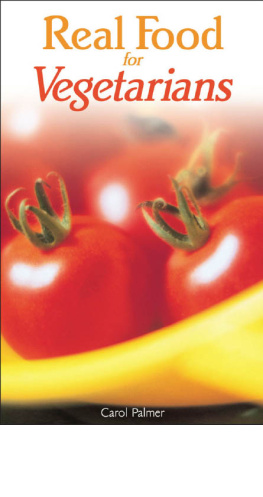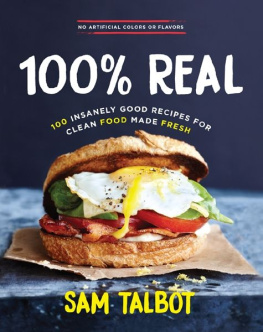Kate Walsh wants to change the way you eat. A self-taught cook and sustainable food advocate, she is shining a spotlight on simple ways to transform how we cook, shop and think about food. Working on organic farms and with Slow Food USA instilled in Kate a dedication that ultimately sparked the creation of Real Food Projects, an active community of chefs, growers, foragers, butchers and eaters.
Real Food Projects runs cooking classes in Sydney and Byron Bay, where Kate teams up with top local artisans to teach essential kitchen skills so that we can all skip out of the supermarkets without looking back.
When not teaching, Kate spends her time writing, parenting and cooking. Lots and lots of cooking.
realfoodprojects.com
BREAK UP WITH
YOUR SUPERMARKET
& EAT REAL FOOD.
Real Food Projects is your handbook to 30 essential cooking skills that will connect you with your food again. Even if youre a kitchen rookie, youll soon be churning your own butter and slathering it on your own no-knead bread, barbecuing your own homemade sausages or using the seasons freshest fruits to make your own cordials. Step-by-step instructions and photographs guide you from start to finish.
For too long weve been sold the idea that making our own food is difficult, time-consuming and not worth the effort. But self-taught cook and sustainable food advocate Kate Walsh knows that learning how to cook a few kitchen staples from scratch, using fresh local and seasonal produce, is the best way to improve your health and that of our food system. Better yet, it tastes delicious!
Get involved and get stuck into some real food projects today.
CONTENTS
INTRODUCTION
Its hard not to feel the change in the air. Backyards, allotments and balconies heaving with home-grown tomatoes and lettuce, people coming together to fill jars with seasonal pickles and jams, farmers markets packed from dawn to dusk, and backyard chooks and beehives making a serious comeback. An ever-growing number of people want to improve their relationship with food and learn new skills in the kitchen.
Why are we heading back into the kitchen in droves?
People are waking up to the reality that what we eat and how we cook has a big hand in shaping our world. American poet and farmer Wendell Berry argues that eating is an agricultural act. In other words, with every mouthful we take, we connect to the people who make our food and the type of food system we support. And it is this story, the story behind our food, which is making people increasingly uncomfortable.
We have found ourselves in the midst of a burgeoning industrialised food system that favours big business over small-scale, sustainable and resilient food producers. Our broken food system produces waste and causes obesity, is a major driver of climate change and is making us sick, yet still millions go hungry. Gone are the high streets full of bustling small businesses the butchers, grocery stores, bakers and fruit shops. Theyve been replaced with large supermarket chains that dominate our consumer grocery market. They shape the kind of food we load in our trolleys and make it nearly impossible for smaller, family-owned businesses and local farms to survive. Taking seriously the responsibility of where to put our grocery dollars has never been more important.
Creative opportunities lie in making food chains better, not bigger. We need diverse, local food economies, where consumers can be guaranteed access to locally grown, ethical and affordable produce. This is no time for food-as-usual. To learn to cook might just be one of the most fundamental steps we can take to move away from our reliance on the industrialised food system and take an active part in building the food system we want.
But just as importantly, we are also rediscovering the pleasure of cooking and eating real food together. Over the past 40 years, weve been sold the idea that making food from scratch is too difficult, more expensive and too time-consuming. We responded by eating out more and relying on processed foods to feed our families. The irony is that we were meant to be happier without the drudgery of cooking when, in fact, it is the very act of buying the best seasonal produce we can, and cooking fresh, real food that brings us so much joy and pleasure.
Learning the magic of combining simple ingredients such as flour, water, yeast and salt to end up with a spectacular loaf of bread to share can be a revelatory act. To taste a peach at perfect ripeness and feel your tastebuds explode can be mind-blowing. Bringing people together to make the most of the tomato season builds community in a very special and authentic way. It is this feeling of connecting through real food that is bringing people back into the kitchen and back to the dining table.
Were also learning that eating foods containing a long list of numbers and odd-sounding ingredients makes us sick. The best way to make sure that you know what is in your food is to cook it yourself. I have found a simple joy in that sense of self-reliance, learning new skills and having the ability to do things in a better way. I want to pass that on to you and your family.
With this handbook by your side you will learn 30 food skills, step by step, which will put you on the path to learning how to cook a great deal of your food from scratch. You dont need a degree from a culinary college to make a wonderful jam, fiery mustard, great sausages or seriously good kim chi. Get started and learn what you love to cook.
The more often you make each project, the better you will understand the process and then you can jump off and be creative. The only way to learn how to cook is to make mistakes and make them often. Believe me, Ive made my fair share. If your jam doesnt set, you have a great sauce for ice cream. If your sausages break, youll have awesome-tasting mince for a spaghetti sauce. Mistakes or not, youll learn something and next time it will be better.
Im also a big believer in not using fancy, expensive kitchen equipment. I dont have the inclination to build a massive backyard smoker or make thousands of sausages. The projects in this book are for the home cook and the home kitchen so if you have a wooden spoon and a few bowls, you are well on your way. You will need a few bits of special equipment to make passata and sausages, but you wont be making these things every day and the tools can be shared between families.
I have given approximate yields for all the recipes, but be aware that they will change depending on the season. If it has been a good year for plums, they will be plump and full of juice and youll get more jam. If it has been a tough year for peaches, the chutney yield will be less. This is part of the joy of cooking seasonally.
I want to help you change the way you eat and I hope this book will give you the skills, confidence and inspiration to get into the kitchen and have a crack at it. Good luck and let me know how you go!

